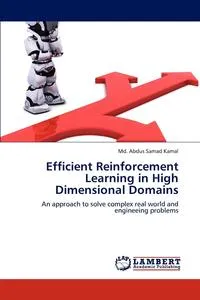Efficient Reinforcement Learning in High Dimensional Domains
Автор: Md. Abdus Samad Kamal
Переплёт: Мягкая обложка
📙 This book presents development of efficient reinforcement learning methods in a postgraduate research. A reinforcement learning agent tries every state-action pair to find the optimal policy without prior knowledge about the domain. In large domains visiting every state-action pair is not feasible by an agent, therefore standard reinforcement learning approach is not applicable in solving many real world problems. Three new methods are proposed to make the learning efficient according to the characteristics of the problems: Task-Oriented Reinforcement Learning reduces the problem size by viewing it from the task's viewpoint that clarifies task relevant state variables. Symmetrical-Actions Reinforcement Leaning reduces the size of a learning problem by exploiting partial symmetry over action relevant state variables and representing actions values by a single function. Coordinated Multiagent Reinforcement Learning technique uses coordinator-agent hierarchy to keep the size of individual learning problems small. Depending on problem characteristics all or any of these methods can be applied to solve a problem efficiently using reinforcement learning.
Мнения
